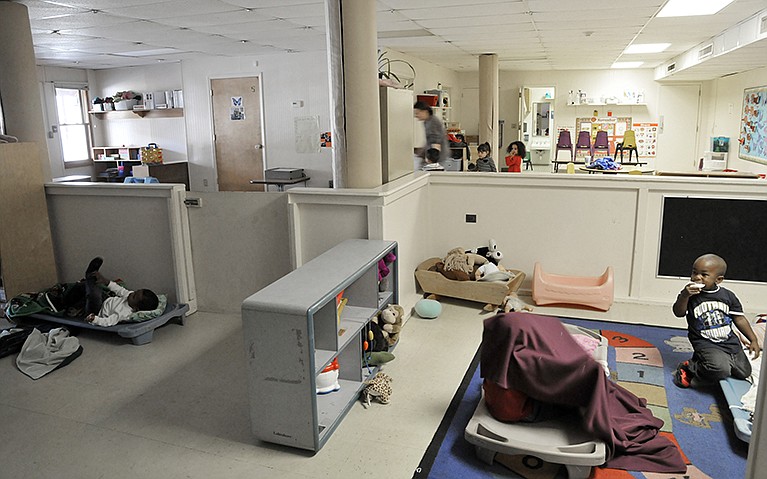Gov. Jay Nixon has been traveling around the state this fall, announcing "Start Smart" funding for pre-K programs for lower- to middle-income families.
The $10 million initiative is part of a larger push to fund early childhood education in Missouri. Nixon also restored about $7 million in state funding this year for the Missouri Preschool Project and Early Head Start.
The idea, taglined "Now for Later," is that investments in preschool programs lead to economic development for Missouri down the line.
"Simply put, early childhood education is a smart investment with a big return," Nixon said while presenting Start Smart funding to the Jefferson City Day Care Center recently.
Research supporting the economic development theory is strong: According to early childhood researcher Irma Arteaga, children who participate in a high-quality preschool program are more likely to graduate high school, go to college, own a house and hold a job.
The children are also less likely later on to be incarcerated or rely on social programs such as welfare.
A chorus of voices across the state has begun lobbying the Legislature to make early childhood education a funding priority. A Missouri House education committee visited 11 cities this fall to hear the public's concerns, and at least one person mentioned pre-K funding at each stop, Rep. Ira Anders said.
When the committee stopped in Columbia on Oct. 23, three of 15 people who testified at the hearing advocated increased funding for early learning programs. Jack Jensen, who heads a Columbia early learning nonprofit, compared well-taught preschoolers to NASCAR driver Carl Edwards.
"When Carl starts in the front of that NASCAR race in one, two, three position, I think there's a pretty good chance he might pull it out," Jensen said at the hearing. "The kid who comes to kindergarten ready to learn is in that front row."
The chorus of voices cannot, however, come to a conclusive decision about the best funding model for early childhood education. The Start Smart initiative has awarded grants and tax credits to 11 programs across the state, and the Missouri Preschool Project also benefits just a few centers at a time.
Overall, state funding for early childhood education gives access to about 30 percent of Missouri kids ages 3 and 4, said Rep. John Wright, D-Rocheport.
"They are a sort of patchwork, and there are a lot of gaps in that patchwork," he said.
Advocates for early childhood education funding now aim to figure out how to close those gaps.
State efforts
Arteaga said landmark studies show three key tenets of high-quality preschool programs: certified teachers with bachelor's degrees in education, strong curricula and parent involvement.
But the funding needed to implement those standards isn't always available.
"Usually, when there are funding cuts in education, the first thing that the government cuts is preschool," said Arteaga, an assistant professor at MU's Truman School of Public Affairs.
This year's state budget includes about $408 million for early childhood education programs, according to documents provided by the Office of Administration.
Six of seven programs focus on low-income families or children with disabilities. The seventh program, the Missouri Preschool Project, provides seed money for preschools that meet state early learning goals.
The Start Smart initiative, in addition to those seven, directs tax credits and federal grants to the improvement or expansion of high-achieving pre-K programs. The Department of Economic Development oversees the initiative.
Recipients of Start Smart funds are selected based on their need and their adherence to state early learning guidelines, among other criteria. Those guidelines suggest skill levels in literacy, math and science, as well as checkpoints for physical and social development.
The organizations have to submit a quarterly report and be audited by a third party to ensure the funds are being used properly. But the state can't enforce educational standards on preschools, according to Sarah Potter, a spokeswoman for the Department of Elementary and Secondary Education.
"Missouri Early Learning Goals are recommended and encouraged to be used, but not required to be used by any group of providers or schools," Potter said in an email.
The Start Smart initiative rewards preschools that are already meeting state standards, but doesn't help programs that haven't reached them. That distinction doesn't seem right to Rep. Mike Lair, chairman of the Joint Committee on Education and the House Education Appropriations Committee.
"In my job with the appropriations for education, it's necessary to look at all 522 school districts," said Lair, R-Chillicothe. "To have one entity pick winners and losers - I don't think it's the best way to distribute funds."
Lair also said he felt the Department of Elementary and Secondary Education should lead the initiative instead of the Department of Economic Development.
"Why wouldn't we want the people who are experts in education distributing this money, rather than the governor's office?" he said.
The two departments worked together to evaluate applicants for the funding, said Amy Susan, a spokeswoman for the Department of Economic Development. But as a "community development activity," the project falls under Susan's department.
Like Start Smart, the Missouri Preschool Project and Early Head Start benefit just a handful of pre-K centers each year. The Central Missouri Community Action Center in Columbia is one of 10 organizations in the state that receive Early Head Start funding, according to Department of Social Services documents.
Although some Start Smart money can be used for teacher training or curriculum, all $7.1 million of the funds that have been announced so far have been for building costs.
The 11 current recipients will be required to spend the funds on facilities, either improving existing buildings or adding rooms to educate more children.
Susan declined to provide information about grants and tax credits that have not been announced yet.
"When you are (in) a building this age, you show a lot of wear and tear," said Donna Scheidt, executive director of the Jefferson City Day Care Center, built in the early 1970s. The nonprofit center received $200,000 in tax credits, which will be used to refund half of the donations the center receives, up to a total of $400,000.
The center will use the money to add a fire escape and make sure teachers have good sight lines to all areas of their classrooms. The changes will not only make the building safer, Scheidt said, but also improve the learning environment.
"I have a big room with a half-wall," she said. "When one teacher is on one side trying to read a book to her children, and another teacher on the other side is trying to teach a music lesson, the noise level is distracting."
Room for improvement
Although funding increased for certain state early childhood programs in fiscal year 2014, some pre-K advocates mourn the recent loss of programs that they say benefited Missourians immensely.
Because of a law passed in 2012, Missouri is the only state without a quality ratings system for preschools, said Erin Brower, vice president of the Alliance for Childhood Education. She said that needs to change.
A ratings system would inform parents of their choices and give preschools a bar to reach, added Jack Jensen of First Chance for Children.
"We are always asking for proof that something is being done correctly," Jensen said. "We test our kids in school, we rank our universities, and we're saying that early childhood education should not be rated? It makes no sense to me."
Accreditation facilitation funding was also cut in 2012, Brower said. That money helped preschools reach national standards.
Tom Rose, a Columbia school board member who speaks to business groups to increase support for pre-K funding, said the ideal state model would be a foundation formula that includes preschool.
"In my mind, ideally we would have a universal pre-K program that would be voluntary," Rose said.
That option will be on the table when the state legislature reconvenes in January. Rep. John Wright plans to reintroduce a bill he sponsored last session that would fund preschool through the foundation formula - provided the formula is fully funded.
"It would act sort of like a caulk to fill in the gaps," Wright said of the bill.
Wright said the bill saw strong support from education and business groups. It was well-received by House members on both sides of the aisle, but came up short because of a few senators, he said.
"Three- and four-year-olds don't vote, and they don't contribute to a lot of political campaigns," but other groups do, Wright said. "For that reason, the future is often underrepresented in our policymaking."
If the bill passes, it might not affect preschools for a while: The foundation formula is underfunded by $600 million, and some legislators think it will stay underfunded as the state struggles to balance the budget.
"We've just got to come up with the money ... If I had an answer, I'd bottle it, sell it and retire," said Rep. Ira Anders, D-Independence.
Twenty-four states fund pre-K through their school funding or state aid formulas, including Kansas, Iowa and Nebraska, according to the National Institute of Early Education Research.
The institute, based at Rutgers University, stated in a policy brief that "states that do not fund early childhood education through their school funding formulas should work toward that goal."
Wright said he's looking forward to re-introducing his bill in the 2014 legislative session. To him, the chance to invest in early childhood education is invigorating because the results snowball to benefit the whole state.
"What's most exciting in public policy are the opportunities to put together one plus one and get something that's much greater than two," Wright said.


